#Welsh Revival
Explore tagged Tumblr posts
Text
instagram
0 notes
Text
Van Gogh and Revival: A few events in the history of Christianity in the Mons, Borinage region of Belgium
I'm fortunate to live in another fascinating place where God has been at work. Please take a few minutes to read about how the Holy Spirit has moved here in Mons, Belgium.
I move house a lot, which is partly why this blog is called ‘Dislocated’. My husband and I have lived in nineteen houses over the past 25 years, and right now, we find ourselves in the southern part of Belgium. The area has a bloody history; within walking distance of our house is a plaque that marks the spot where the first shots were fired in World War I. Tragically, the memorial was unveiled…

View On WordPress
#Art#Belgium#Borinage#Christian#Evangelist#holy spirit#Mineworkers#prayer#Preaching#Protestant#Revival#Van Gogh#Welsh Revival
0 notes
Text
Everytime The Witcher appropriates the welsh language but the has the GALL to mispronounce it, the power of my rage grows
do you know how seldom Welsh gets a fucking look in?! and the you have the gall to pronounce it like its fucking English
#the witcher#welsh#like i want to be excited because YAY WELSH#but then they do that#HE SAID SHAERRAWEDD 'Cher-Wed' i'm going to scream#its not even proper Welsh but if you're going to base your conlang that hard of an existing language i beg of you learn the rules#say it Shere-a-with#i'm going to start showing witcher colang to my nain to cause her psychic damage#i joke but tbh i think she would like that someone is taking the language she had stripped from her as a kid and is reviving it in a new wa#Anya at least says the first part right#to the point i suspect she studied and did her best but the directors fought her on the dd
600 notes
·
View notes
Text
Speakers of non-English languages of the UK and Ireland wanted!!
Since it’s World Mother Language Day today (February the 21st), I’m thinking of doing a series of posts on the native non-English languages of the United Kingdom and Ireland, with some information and short interviews.
For this, I am looking for both native speakers/signers and learners (with or without parentage/heritage of the language in question) of the following languages:
- Scottish Gaelic
- Irish
- Welsh
- Any sign language of the United Kingdom or Ireland (e.g. BSL)
- Any other minority language indigenous to the United Kingdom or Ireland. By this I mean primarily spoken only within the UK or Ireland as a minority, or spoken very little elsewhere. For example: Cornish, Manx, Shelta, or Anglo-Romani, not languages like Polish or Bengali that are minority within the UK but have a significant speaker base elsewhere. (I am aware that I am fishing for some of these *cough* Cornish *cough*...but you never know!)
- Any language or variety that you speak that you feel is linguistically / culturally distinct from Standard English that you would like to inform more people about. For example: Shetlandic, Scots, Ulster Scots.
I don’t have anything finalised yet, but if you would be wiling to speak to me about some text-based interviews for the sake of qualitative and informative tumblr posts, please send me a message!
(NB: if I have used any names of languages that are not preferred, tell me and I will change them. I don’t know a lot about the non-Celtic and non-Germanic languages here, which is part of my reason for wanting to make this series of posts in the first place.)
Please reblog so more people see this!
- meichenxi
#irish#welsh#scottish gaelic#gaelic#bsl#world mother language day#please reblog <3#every single time I tell anyone (brits included) about the variety of languages that exist natively in the UK and Ireland I die a little#<< that is a joke and I enjoy informing others but also. there's more than english please#cornish and breton and manx....look. if ANYONE on the internet is learning those languages as a second language learner#they are on Tumblr. this I know to be true#*manifesting*#cornish is on my list of celtic languages to learn in the future. but first gaelic. and then welsh since my family is moving there#and THEN perhaps cornish. *meme voice* I just think it's neat!#I also like the challenge of being at the forefront of a revival moment that is almost entirely made up of nerds (affectionate)
462 notes
·
View notes
Text
sometimes when you look into historic myths and stories older than a couple hundred years you are going to meet characters that you cannot relate to and don’t particularly like because their values are wildly different than yours. and you do, actually, have to accept that and look at what the stories are actually saying and what they reveal about the world instead of tossing them aside rewriting them to suit your tastes, or else you’re going to just be another iolo morganwg and you don’t want to be another iolo morganwg.
#iolo morganwg was fascinating and bore a tremendous amount of responsibility for the late 18th/early 19th century welsh cultural revival#but We Do Not Need Another One#sroloc babbles
26 notes
·
View notes
Text

#grunge fashion#2014#grunge outfit#2014 tumblr#outfit#2014 revival#marlboro#marlboro reds#2014 nostalgia#2014 grunge#2014 aesthetic#alternative#grunge ootd#ootd#grunge#grunge aesthetic#welsh#converse#waterstones#ripped tights#2014core
31 notes
·
View notes
Text


vinted love recommending me absolutely insane items but ... a copy of the hobbit in CORNISH ????
#i have maybe three mutuals who will find this interesting but my mind is absolutely blown#i thought it was welsh at first. but no. kernowek !!!!!!!!#so insanely proud of the cornish for resurrecting their language. i need to get more involved in the Cumbric revival scene#because you still hear local farmers speaking in bits of Cumbric.
13 notes
·
View notes
Text


Parallels
Or
Seeing Patterns in Things That Aren’t There
Part 51.
He Couldn’t see the Forest for the Trees
Also known as
The Felling of the Trees
Or
The Trees Strike Back
1. “Of course, it is likely enough, my friends,' he said slowly, 'likely enough that we are going to our doom: the last march of the Ents. But if we stayed home and did nothing, doom would find us anyway, sooner or later.” - Treebeard
- The Lord of the Rings: The Two Towers (1954).
J. R. R. Tolkien.
(Art by Matt Ferguson)
(I was going to use some screenshots from the film adaptation but I couldn’t find any in good enough quality)
Kind of speaks for itself.
Treebeard and the Ents awaken from their long sleep with Merry and Pippin at their side to see the forest of Fangorn being razed by Saruman’s army of orcs and Uruk-Hai to fuel his war machine.
And after much deliberation, as his forces are away attacking Helm’s Deep, Treebeard and the Ents decide to launch an attack on Isengard when Saruman least expects it.
Kicking his ass and razing his infernal war factory to the ground in the process.
2. “Alder, pre-eminent in lineage, attacked in the beginning;
Willow and rowan were late to the army;
Thorny plum was greedy for slaughter
...
Fir trees to the fore, ruler in battles;
Ash performed excellently before monarchs;
Elm because of its ferocity did not budge a foot:
it would strike in the middle, on the flanks, and in the end.
...
Swift and mighty oak: before him trembled heaven and earth;
Fierce enemy of warriors, his name in wax tablets.'”
etc.
- Cad Goddeu (The Battle of the Trees). 14th Century. Attributed to Taliesin.
(From the Book of Taliesin. A 14th century manuscript containing a collection of poems in Middle Welsh. A folio of which is depicted above)
(Passages from this poem were also translated into Sanskrit and used by John Williams for the Duel of the Fates in his score to the Star Wars prequels)
Kind of speaks for itself.
One cannot help but wonder.
Given Tolkien’s fondness for Celtic mythology and his love of the Welsh language, did he perhaps know of the Cad Goddeu and/or the Book of Taliesin, and could it have inspired the creation of the Ents and their role in The Lord of the Rings?
(Although the circumstances are a bit different. The Ents were always fully sentient beings, while the trees in the Cad Goddeu are enchanted by Gwydion.)
Now it is known that their actions were also his means of throwing shade at William Shakespeare due to his personal disappointment concerning a similar scene in Macbeth but more cannot be said of such matters beyond this.
Regardless, I felt that it was worth pointing out.
Make of this what you will.
#dougie rambles#personal stuff#parallels#my poor attempt at a joke#or is it#jrr tolkien#middle earth#lotr#the lord of the rings#ents#trees#treebeard#wales#welsh language#cymru#cymraeg#celtic languages#language revitalization#language revival#poetry#medieval poetry#cad goddeu#Taliesin#make of this what you will#literature#macbeth#sanskrit#tangentially#fangorn forest#isengard
5 notes
·
View notes
Text
Language Goals 2024
Another year, another set of goals! This year, in the actual spirit of my very reasonable 2022 language goals, here are my plans for language study.
Catalan
First and foremost, my goal is to find Catalan friends in my new hometown, because I really need to speak Catalan with people at minimum once a week or I get very sad, and currently I’m not speaking it with anyone at all. This goal is pretty chill though—I just have to actually sit down and put in the time to find people.
My main goal is to read 30 books in Catalan. I’ll make a proper post about it with a list of books that I’m thinking of and how the challenge itself is going to work, but overall I’m trying to pick a mix of styles and genres, so expect anything from medieval literature to YA novels to academic texts. I have a lot of books that I’ve been meaning to read for a while, so hopefully this will give me a chance to chip into some of them. 30 books is less than other versions of this challenge that I’ve seen, but it’s also many more books than I’ve read in Catalan possibly ever and I think it’s more reasonable in conjunction with a full class load. Hopefully it ends up being just the right amount!
Welsh & Basque
This year I really want to work hard to actually get these two to an upper intermediate level, because I’m so close if I put in the work. For both of them, I have two main goals: (1) go through the textbooks/workbooks that I started going through casually last semester (Basic Welsh: A Grammar and Workbook by Gareth King and Standard Basque: A Progressive Grammar by Rudolf P.G. de Rijk) so that I can continue to review and learn new grammatical structures, and (2) watch one episode of a TV series each week in each language. For the TV series, I’m going to be watching Rownd a Rownd on S4C (which is available outside Wales/the UK! Huge win!) and Eskamak kentzen on EITB. If I have time, I’ll try to go through episodes more thoroughly and note down new vocabulary and such, but the main goal is to make a routine of it and watch consistently so I’m trying to keep it simple. I’d also like to use both languages with other people more often if I can, but I think finding a consistent language partner will perhaps be a goal for another year.
Malayalam
I’m planning to focus the first half of the year on Welsh and Basque, and then next fall, I’m hoping to be able to take the Malayalam classes offered by my university and to get into studying my home dialect (or rather, my extended family’s home dialect, since I didn’t speak it at home) as well. Since this will be later and also classroom learning rather than self-study, I’m not going to go into details, but overall, after my trip to Kerala (which I have stuff about, it’s on the docket!), I’m generally feeling much less alienated and much more motivated to study the language. I’m also looking forward to being able to take real classes, which I think will help keep me focused and on track.
Russian
This is a minor goal, but at my friend’s house over the summer, her mom was joking that if they just spoke to me in Russian while I stayed at their house, I’d probably be able to understand it by the end. That led us to concoct a plan where I study a bit of Russian vocab, then go there and do intensive Russian immersion for a weekend or so. This is more of a silly goal, but I’d like to try it because I think it could be fun.
Anki
This isn’t a language goal per se, but rather a general resolution to spend this year learning to use (and tweaking and configuring) Anki. Anki has a notoriously high barrier to entry, and from everything I’ve seen it should be treated as a long-term, intensive project—I’ll hopefully reap the rewards later if I take my time and set up everything right in the early stages. With that in mind, I’m hoping that by the end of the year I’ve figure out a set up for my decks and cards that really works for getting me to remember and be able to use vocab and grammar. I’ll focus on the languages here for the start, but I’m hoping that with habit and time, if I get a good system going I can use it with other languages too.
And that’s it! It’s been a bit since I was systematic about studying languages, but I’ve found that I really miss it and want to go back. I feel like I’m at a really good place with all of these, and I’d like to continue to make progress, so I’m really trying to focus on consistency and hitting the sweet spot of just challenging enough to get myself out of my comfort zone while not burning out. Hopefully I’ve set this up in a way to build habits and make me excited to keep immersing myself with these languages in the coming years, which is really the key to learning any language in the long term—I've realized that I speak Catalan so well because it's fully integrated into my life, and I'd like all these others to be as well. Here’s to a good 2024, and I wish all of you luck with your own goals as well!
#a few days late but whatever#i've had a lot of spatial and temporal displacement in the past two weeks i think i'm allowed this one indulgence#i am trying SO HARD to set achievable goals#i'm so so bad at it but i'm slowly getting better hopefully this will be the year#also i forgot to include this but i really do need to get my spanish back up to speed#or not even up to speed at this point i haven't studied it since high school so i need to actually learn new things#a professor in the spanish department switched back to english while talking to me because i spoke it so poorly with him :')#però és que em fa pal el castellà no el necessito per res (<- mentida)#on the other hand solomon a gaenor has completed revived my energy for studying welsh and going to kerala has done it for malayalam#which um. i didn't even realize i could be that interested in studying malayalam. wowee we have unlocked feelings and emotions lads!#anyways we'll see how this goes but i'm going to do my best :')#general:goals#catalan:goals#welsh:goals#basque:goals#malayalam:goals#russian:goals
22 notes
·
View notes
Text
basimishaq > caernua
teehee
#yes i know it's caed nua but caer is the original welsh word anyway + in dragon age they call the fortresses caer so🤡#I NEED TO LIVE OUT MY REVIVED FANTASY RPG ERA bc i have thought of this url for 2 months now so i had to <33333#i actually miss caed nua like crazy :( there's just SOMETHING about it#pls i need poe3 tomorrow so we can rebuild it and we'll be able to interact w the steward again#it's gonna be great#.txt
14 notes
·
View notes
Text
favourite phrase ive learned from bewnans meriasek is ‘malbe dam’ which is defined as ‘[may] the plague take’ by the dictionary but i think its actually more like ‘damn the plague’ ie ‘despite everything’ ‘for fucks sake’ it was used as an intensifier like how we’d say ‘the [damn] something’ or ‘something something, ill be damned’
‘Nyns eus ger gwir, malbe dam’ - ‘not a true word, damn the plague’ actually more like ‘not a [damn] true word’
‘nyns usi ev, malbe dam’ - ‘he is not [there], damn the plague’ ‘hes not fucking there’
‘malbew, an flogh a skapyas’ - ‘plague! the child [has] escaped’ ‘fuck/damn it!, the child has escaped’
#kernewek#kernowek#cornish language#love how in learning cornish you must simultaneously learn 1. cornish as attested and revived#2. old brythonic and the vocabulary shared between welsh and cornish#3. some latin and 4. a LOT of middle to early modern english
9 notes
·
View notes
Text
Duolingo is far from being the perfect language-learning app, but man, do I love learning Welsh.
#crystal visions of lilies in the valley#one of these days I'll go back to learning Spanish finally...and reviving my grasp on French also#but for now I have a 10 day streak on Duolingo thanks to Welsh. :')#there's still a lot that I'm learning that I do not understand (what the fuck are pronouns and how do I use them in a sentence?!)#which makes me yearn for an ACTUAL teacher...but for now it's going okay!
2 notes
·
View notes
Text
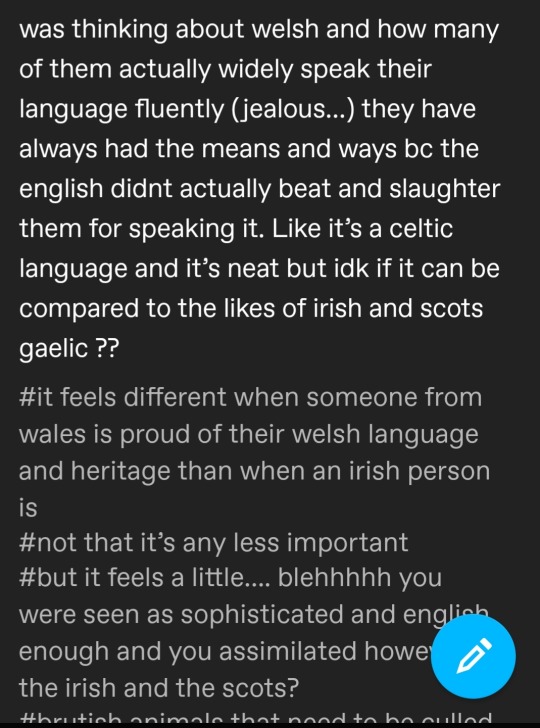
I'd like to preface this with that this is a screenshot of a post I saw a few days ago in the #welsh tag and that the OP has since deleted this post, but the sentiment is something I'd like to address since I see a lot of parallels with this kind of thinking in other contexts, such as in LGBTQIA+ rights conversations.
So, the most obvious elephant in the room is the idea that Welsh is super widely spoken in Wales now and that it isn't in as much danger as other Celtic languages. This idea is wishful thinking at best and erases the very real danger that Welsh is in and that it could be lost just as easily as Irish or Scottish Gaelic. Cornish (which is related to Welsh) actually did die out and has had to be revived. To make a metaphor out of this, we classify languages on a scale of non-threatened to endangered in a similar way to how we classify species.
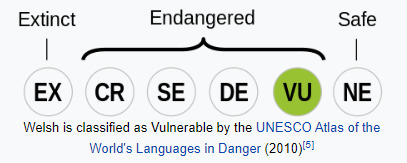
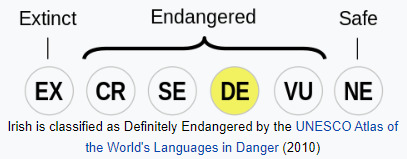
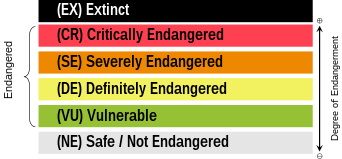
Here are the statuses of Welsh and Irish as of 2010 (above) and the statuses of Lions and Tigers (below).

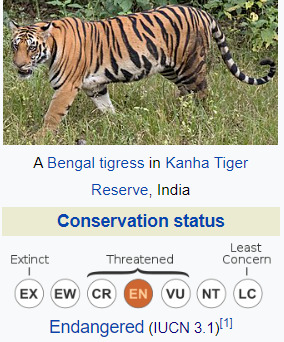
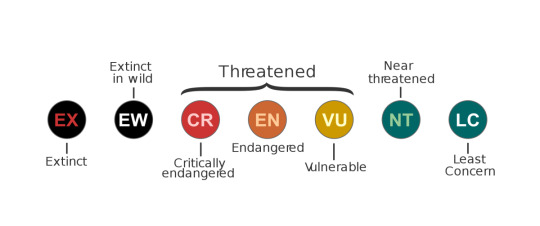
On paper tigers are more 'in danger' than lions. But that does not mean that lions are suddenly not in danger at all. The little bracket above CR, EN and VU labels all of these classifications as threatened. It isn't (and definitely shouldn't) be a competition of 'who is most in danger' because you do not want the thing you care about (whether it be a species or a language) to be in danger.

To come back to the original screenshot "they* [Welsh speakers] have always had the means and the ways because the English didn't beat or slaughter them for speaking it"- on the most basic of levels, this is just incorrect. The Welsh Not was a wooden token hung around schoolchildren's necks if they spoke Welsh in school. If someone else spoke Welsh the Not would be hung around their neck. At the end of the school day, whoever was wearing the Not would be beaten and caned by their teachers. I needn't go into much detail but there have been concerted efforts to beat Welsh out of schoolchildren. With the lions vs tigers metaphor, making the claim Welsh speakers have never been beaten for speaking Welsh because they always had the means and ways, while Irish speakers were beaten and never had the means or ways is like claiming poachers have never shot lions, only tigers. Bottom line is, lions and tigers are both victim to poaching and both species have suffered as a result. Similarly, Welsh and Irish have both suffered language loss and both need conservation efforts in order to survive.
(*sidenote- the consistent use of 'them' and 'they' in the original post is definitely indicative of a 'us vs them' sentiment which is a deeply unhelpful attitude to have when it comes to endangered languages and the Celtic languages in particular)
I see parallels with LGBTQIA+ rights in this situation. When equal marriage came in for gay and lesbian couples in the UK in 2014, many allies began to act like gay rights had now been achieved and that gay issues had been done, they're solved. Except, they really weren't (and aren't). Progress has been made in Wales and undeniably Welsh is doing the best out of the living Celtic languages. But that doesn't mean Welsh has been saved or that full equality for Welsh speakers has been achieved. It very much hasn't. The sentiment of the post in the screenshot is not conducive to helping Irish or Scottish Gaelic. Putting down Welsh speakers and erasing Welsh-language history will not save Irish or Scottish Gaelic. Pretending Welsh has had it easy in some kind of lap of luxury is a deeply harmful and bogus claim.
I'll address the tags under the cut as this post is getting long.
To address the tags, personal feelings ≠ an accurate reading of a situation. Nor is it praxis, for that matter. Why is pride in Welsh different/less good than pride in Irish? Is it the assumed proximity to England? If so, that's a terrible claim to make. Not only that, but Scotland is also next to England- does that make pride in Scottish Gaelic the same as pride in Welsh according to this metric? It's a ludicrous thing to say and deeply insensitive to the needs of Scottish Gaelic and Welsh speakers, who cannot help any current or former proximity to England.
Additionally, proximity to England ≠ worse. I know it's a popular internet joke to hate on England because of English attempts to eradicate the Celtic languages, but when the joke becomes praxis, it does not help. England ≠ a place devoid of Celtic languages either. Many English counties near the Welsh border actually have communities of Welsh speakers, such as Oswestry (Croesoswallt) in Shropshire. Cornwall is also home to many speakers of revived Cornish. It does a disservice to Celtic speakers in England to insinuate that proximity to England taints or corrupts them somehow. This is how ethnonationalism starts and we ain't about that.
And "#it feels a little.... blehhhhh you were seen as sophisticated and english enough and you assimilated however the Irish and the Scots? #brutish animals that need to be culled". So, this is arguably one of the worst things to say about a Celtic language- or any threatened language in general. First of all, the 'you were seen as' - 'you' is very telling. The switch from 'them', 'they' to 'you' indicates that this sentiment is aimed at Welsh speakers directly. This was likely a subconscious thing that OP wasn't thinking about when they wrote this. But it does indicate unhealthy feelings of jealousy and bitterness unfairly directed at Welsh speakers, who are also struggling. This righteous anger at the decline of Irish and Scottish Gaelic would be better directed at efforts to help promote those languages- some useful things to get involved with are LearnGaelic, similar to DysguCymraeg but for Scottish Gaelic or supporting channels such as Irish channel TG4 by watching their programmes.
The idea that Welsh speakers were or are 'sophisticated and english enough' is insulting and carries with it a lot of baggage of how any of these assumptions came about. Welsh speakers were definitely not seen as sophisticated. Where Welsh was 'tolerated', it was treated as a curiosity, a relic of a bygone age. Classic museification which all Celtic languages and cultures suffer from as well. Welsh was not tolerated in any legal sense since 1535- with English becoming the only valid administrative language and the language of Welsh courts after England annexed Wales into its Kingdom. Monolingual Welsh speakers suddenly had no access to any legal representation, unless they learned English. This is no voluntary assimilation- it is an act of survival for many speakers of minoritised languages to 'assimilate' into the dominant culture, or else risk losing access to legal security and other kinds of infrastructure. You need only ask any non-native English speaker living in an Anglophone country what that process is like. Welsh people did not see English incursion as an opportunity to become 'sophisticated and english enough', they had to assimilate in order to survive.
The "Irish and the Scots? #brutish animals that need to be culled" is also painfully misrepresenting a very complex social and political process that unfolded over the span of hundreds of years. The phrasing itself of 'brutish animals that need to be culled' speaks to righteous anger at the damage done to these languages and cultures, but it reinforces negative stereotypes about the Irish and Scots themselves. It also is more complicated than a simple English hatred of anything non-Anglo, since the English conception of particularly the Irish changed a lot over the centuries. It was (and still is) rarely consistent with itself. See: the enemy is both strong and weak. The very earliest Celticists were by and large, Anglos or French.
Ernest Renan (1823-1892) for example, was an early French Celticist who published La Poésie des races celtiques (Poetry of the Celtic Races- English translation) in which he says:
"... we must search for the explanation of the chief features of the Celtic character. It has all the failings, and all the good qualities, of the solitary man; at once proud and timid, strong in feeling and feeble in action, at home free and unreserved, to the outside world awkward and embarrassed. It distrusts the foreigner, because it sees in him a being more refined than itself, who abuses its simplicity. Indifferent to the admiration of others, it asks only one thing, that it should be left to itself. It is before all else a domestic race, fitted for family life and fireside joys. In no other race has the bond of blood been stronger, or has it created more duties, or attached man to his fellow with so much breadth and depth"
Yeah. This guy (unsurprisingly) was a white supremacist. Note that this sentiment is being applied to all people considered Celtic by Renan- Irish, Welsh, Breton, Scottish, Cornish, Manx etc. None unscathed by the celtophobia of the day. In this period, Celticity was romanticised (yet disparaged at the same time). It is less 'brutish animals' and more 'archaic, time-frozen peoples' in this period. Of course, 'brutish animals' attitudes towards Celticity did still exist, but it is disingenuous to act as if it was this attitude alone which drove English celtophobia. Like many things, it is always more complicated and never clear cut as it might seem.
I'll bring this to a close shortly, but returning to OP's suggestion that the Welsh assimilated and the Scots and Irish did not, is also incorrect in that some Scots did have to assimilate to survive as well. The Statutes of Iona (1609) required Scottish Gaelic speaking Highland chiefs to send their sons away to be educated in Scots and/or English in Protestant schools. Many did as the statutes required, which led to further language loss in the Highlands of Scottish Gaelic. These are acts of survival- and not ones always taken willingly.
This has been a long post but it's one which I felt I wanted to address. There's no need for infighting between speakers of Celtic languages over who has it worse. There isn't any answer to that question, nor is it a good use of time or energy. All in all, the Celtic languages have suffered greatly over the years and its only just now that some of them are turning a corner. If you care about these languages, put your energy into something good. Only through active work will these languages be saved for generations to come.
#long post#lukes originals#cymraeg#gaelige#gaidhlig#Irish#Welsh#Scottish Gaelic#politik#not dictionary related#Celticist#Celtic Studies#This took a lot of energy to write so if you found this post useful please consider reblogging
1K notes
·
View notes
Text
Note: This is just for fun and because I'm nosy. I realize the timeline for inspiration is not always simple and can be a bit muddy.
#arthurian#arthuriana#arthurian legend#arthurian mythology#welsh mythology#geoffrey of monmouth#chretien de troyes#The Vulgate Cycle#Le Morte D'Arthur#Idylls of the King#Howard Pyle
120 notes
·
View notes
Text

#grunge fashion#2014#grunge outfit#2014 tumblr#outfit#ootd#grunge ootd#alternative#ripped tights#sushi#sushi rolls#welsh#salmon sushi#2014 aesthetic#2014 grunge#2014 nostalgia#2014 revival#arctic monkeys
24 notes
·
View notes
Text
So as promised, here's the translation of the interview Morfydd did with Knack in August. I am by no means a translator but I did my best. It's not too long. Some rather interesting bits about how she views Galadriel (also the author of the interview gets Haladriel lol). If you want to read the entire interview in Dutch, it's here (I archived it since you need an account to read it on the Knack site, this way you can read it in its entirety): https://archive.ph/HekvQ
Morfydd Clark keeps getting calls for freaky roles (like for a Galadriel who flirts with Sauron)
During the second season of Rings of Power, the young elf Galadriel will be haunted by the ghosts of her past. Much to the delight of Morfydd Clark, who previously made name for herself as a possessed nurse in Saint Maud. “I love looking for those extreme roles.”
“I would have to board a plane to go home and I can't do that, I thought.”
When Morfydd Clark arrived in New-Zealand five years ago, she had no idea what awaited her. The production for The Rings of Power was notoriously secretive. She knew she'd auditioned for a prequel to The Lord of the Rings. But that she would be playing Galadriel, was new information. Clark had been introduced to the franchise as a child, during a family outing to The Hobbit: A Musical in London. Throughout the following years, she collected illustration books about The Shire and the Peter Jackson movies in her bedroom in Wales. “Unknowingly, I've been preparing for a role in the Lord of the Rings universe for fifteen years”, she tells us through Zoom.
But no book could have prepared Clark for the massive scale on which The Rings of Power operates. It isn't the kind of production with casual fans who are willing to swallow everything. And on top of that: the production value was through the roof. Costing a total of 465 million dollars, the series is the most expensive one ever made. One didn't have to look hard to see where this impressive budget went. From the underground dwarven kingdom Khazad-dûm to the eye-catching splendor of Númenor: even those finding the prequel rather lacking – the series has some flaws – has to admit that the cinematography is breathtakingly spectacular, paling other fantasy franchises in the process.
On top of that, there was the fact that Cate Blanchett's adaptation of Galadriel in the original trilogy has turned into movie heritage. “It helped that I play Galadriel during an entirely different moment of her life, long before she became the Lady of Lothlórien. I delved into the history of the elves, who were pretty wild actually. Did you know that they used to throw each other off of buildings all the time? I wanted my version of Galadriel to be strikingly different from the Galadriel she would eventually become.”
Clark's version of Galadriel is a young, brave warrior who indeed barely resembles Blanchett's ethereal elf. The consequences of a rather unfortunate romantic experience might change that (spoiler: the hunk Galadriel flirted with the entire first season? He happened to be Sauron. Even elves can miss red flags). “She realizes now that she, too, might have darkness within her. Her sense of self is in shambles. We all experience this feeling sometimes, but not everyone revives the evilest being in all of Middle-Earth in the process.” The second season is all about the consequences of this error of judgment. “Sauron haunts her the entire time. She finds herself stuck in her own horror movie.”
Clark describes this new and spooky chapter of her life as 'coming home.' Before her career took her to Middle-Earth, she was well on her way to becoming a Welsh Mia Goth. She played in BBC adaptations of Dracula and His Dark Materials, and in 2019 she was promoted to indie darling thanks to Saint Maud, a psychological horror movie made by Rose Glass (who continued her streak with Love Lies Bleeding) in which she played the titular character. “My parents keep asking me why I am always cast in those terrifying roles. But I think it's wonderful. I love looking for those extreme roles. Although, it is kind of strange to always receive calls for freaky parts. Is that the kind of vibes I have?”
Her freaky vibes are definitely lucrative. Among future roles are a Hamlet adaptation and a slasher, earlier this year she acted alongside Matt Smith in Starve Acre, a British indie horror movie. “That was a lucky coincidence. Matt Smith just finished his takes for House of the Dragon, he has given me so much good advice”, Clark says. It was the first time being back to a small set “where the entire crew fits into one room.” “I don't think the sets for Rings of Power will ever feel like the norm.” Because while every series goes for as much CGI as possible these days, with Rings of Power, the crew aims to build as many of the sets as possible. “Wandering around in such a magical world still feels like winning the lottery each day.”
Despite her success, Clark's acting career started quite accidental. When she was diagnosed with ADHD at the age of seven, a directionless school career followed. She quit when she was sixteen. According to British GQ, her teachers called her 'hollol di gwilydd', meaning 'completely shameless'. It wasn't until she began acting, that she found some sense of peace. And when playing in paranormal and magical fiction, she discovered a world in which she can be herself. “Fantasy like Lord of the Rings reverses the status quo of how we think the world should be. I wanted Galadriel to be free of the things that were imposed on me when I was younger. She isn't apologetic. She never doubts whether or not she said the right thing. And that might be the best part about playing her: Galadriel is shameless.”

64 notes
·
View notes